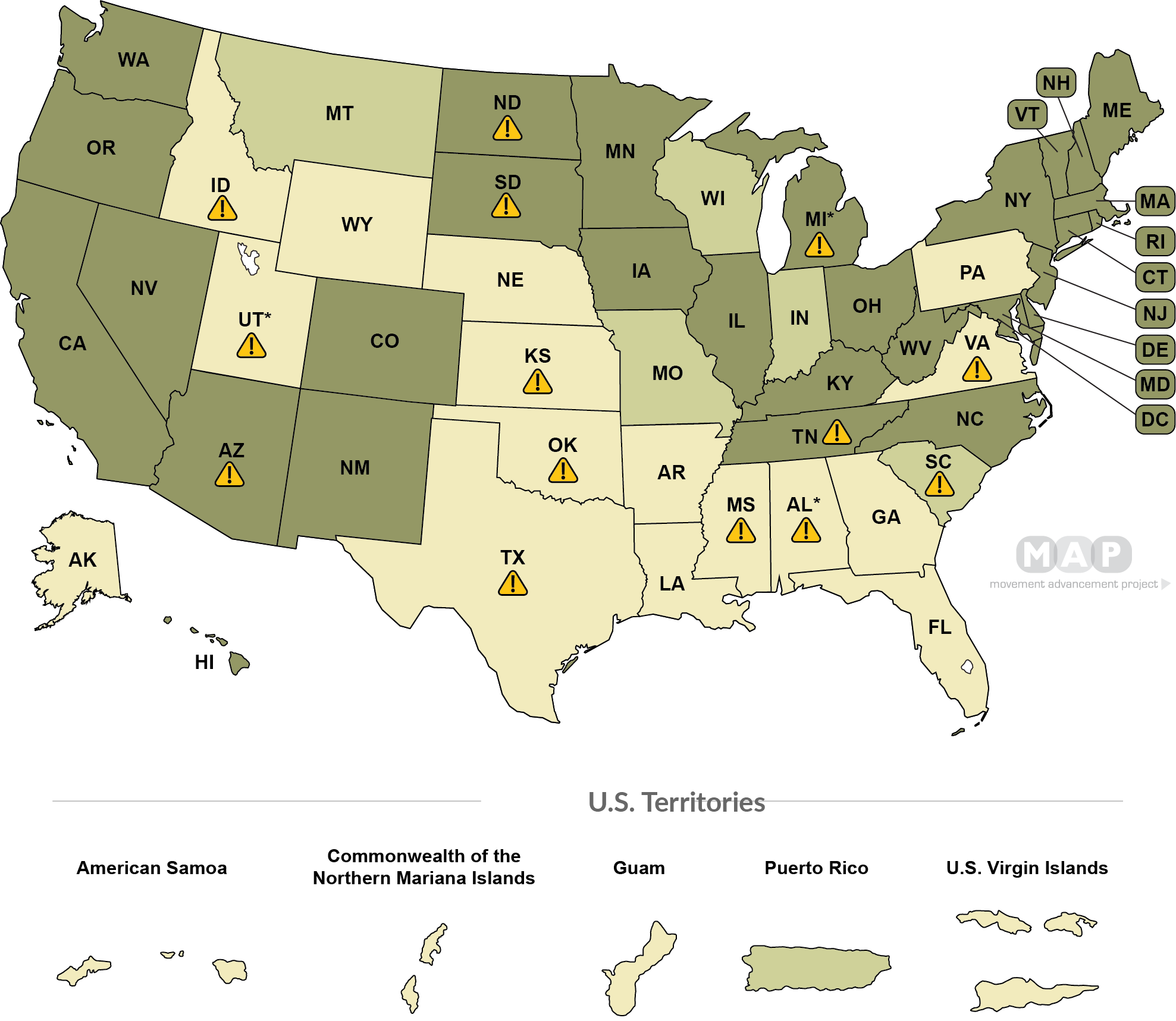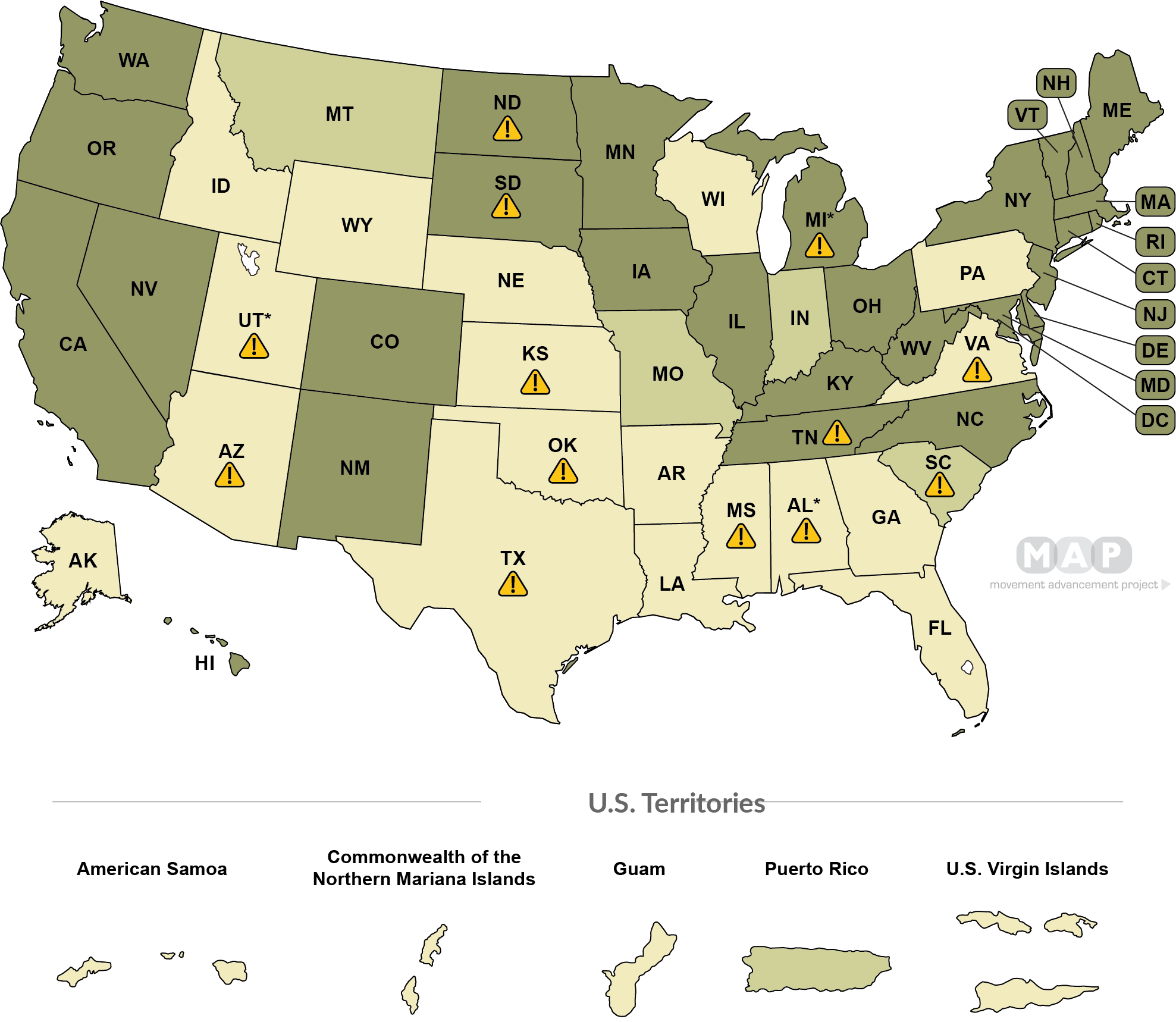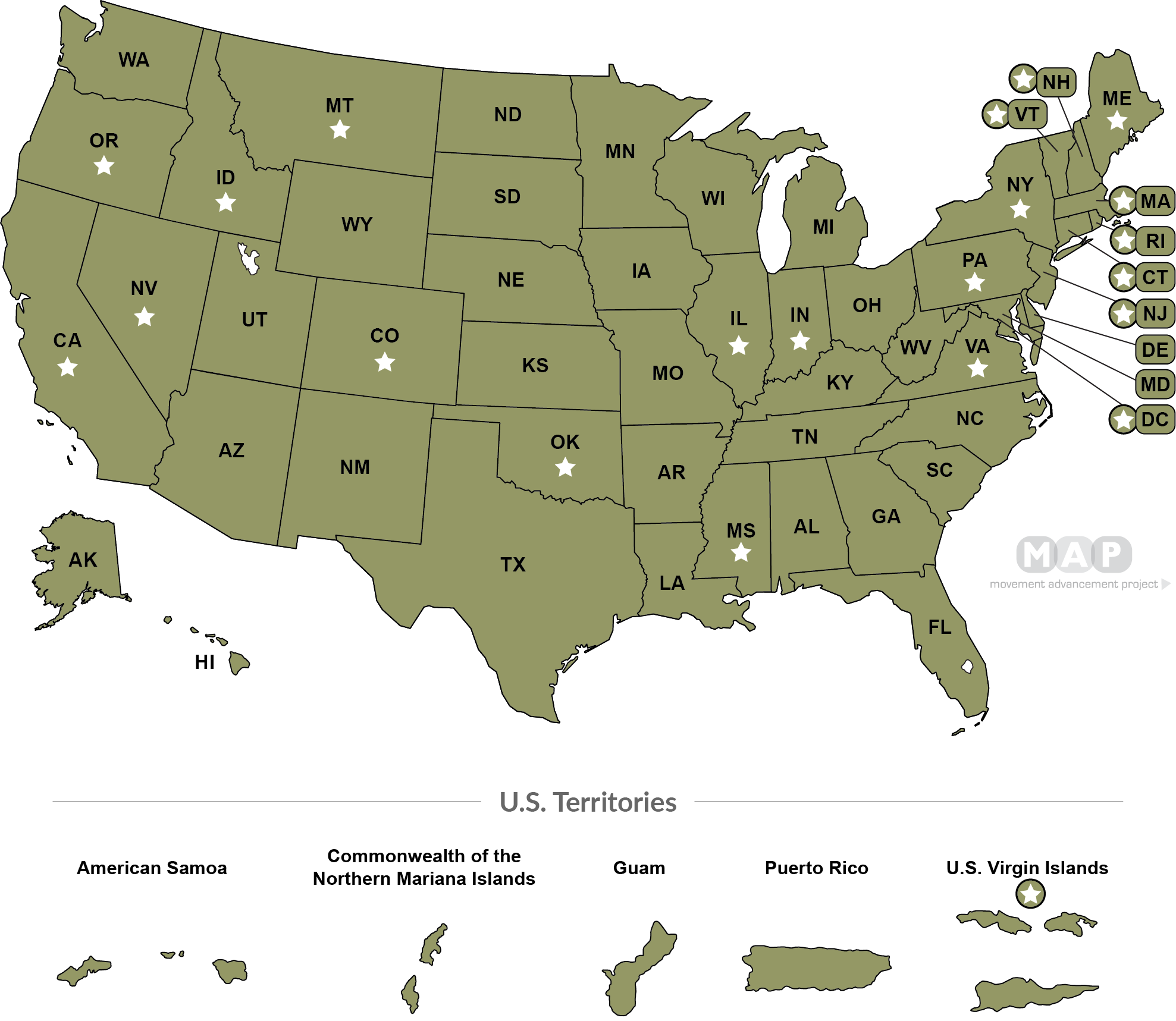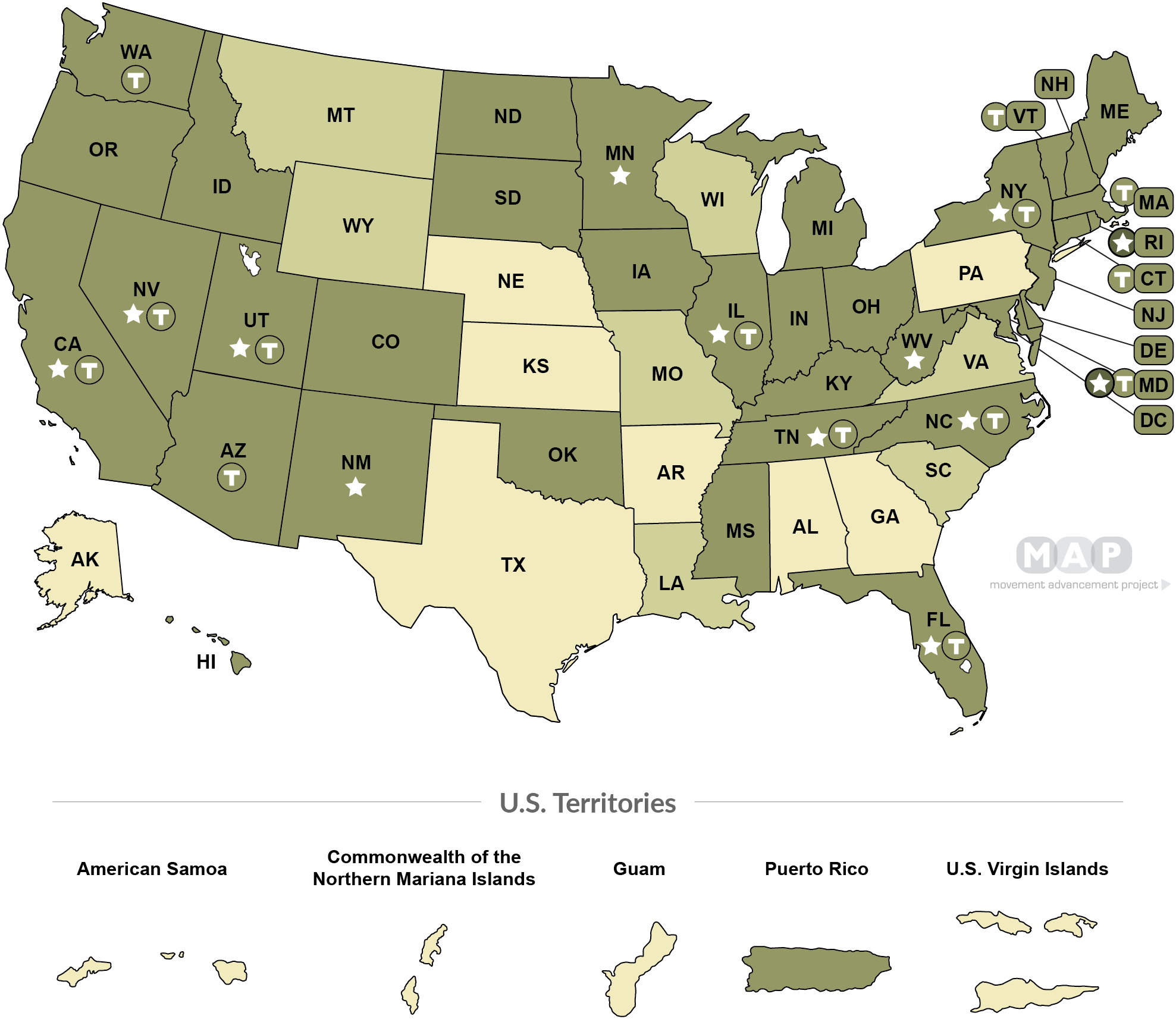| State |
Foster Care |
Adoption |
LGBTQ Youth
in Child Welfare |
Religious Exemptions
in Child Welfare |
| |
Citations
|
Citations
|
Citations
|
|
| Alabama |
|
|
|
State does not have this law |
| Alaska |
|
|
|
|
| American Samoa |
|
|
|
|
| Arizona |
State has law that covers sexual orientation and gender identity |
State has law that covers sexual orientation and gender identity |
State has law that covers sexual orientation and gender identity |
State does not have this law |
| Arkansas |
|
|
|
|
| California |
State has law that covers sexual orientation and gender identity |
State has law that covers sexual orientation and gender identity |
State has law that covers sexual orientation and gender identity |
|
| Colorado |
State has law that covers sexual orientation and gender identity |
State has law that covers sexual orientation and gender identity |
State has law that covers sexual orientation and gender identity |
|
| Connecticut |
State has law that covers sexual orientation and gender identity |
State has law that covers sexual orientation and gender identity |
State has law that covers sexual orientation and gender identity |
|
| Delaware |
State has law that covers sexual orientation and gender identity |
State has law that covers sexual orientation and gender identity |
State has law that covers sexual orientation and gender identity |
|
| District of Columbia |
State has law that covers sexual orientation and gender identity |
State has law that covers sexual orientation and gender identity |
State has law that covers sexual orientation and gender identity |
|
| Florida |
|
|
State has law that covers sexual orientation and gender identity |
|
| Georgia |
|
|
|
|
| Guam |
|
|
|
|
| Hawaii |
State has law that covers sexual orientation and gender identity |
State has law that covers sexual orientation and gender identity |
State has law that covers sexual orientation and gender identity |
|
| Idaho |
|
|
State has law that covers sexual orientation and gender identity |
State does not have this law |
| Illinois |
State has law that covers sexual orientation and gender identity |
State has law that covers sexual orientation and gender identity |
State has law that covers sexual orientation and gender identity |
|
| Indiana |
State has law that only covers sexual orientation |
State has law that only covers sexual orientation |
State has law that covers sexual orientation and gender identity |
|
| Iowa |
State has law that covers sexual orientation and gender identity |
State has law that covers sexual orientation and gender identity |
State has law that covers sexual orientation and gender identity |
|
| Kansas |
|
|
|
State does not have this law |
| Kentucky |
State has law that covers sexual orientation and gender identity |
State has law that covers sexual orientation and gender identity |
State has law that covers sexual orientation and gender identity |
|
| Louisiana |
|
|
State has law that only covers sexual orientation |
|
| Maine |
State has law that covers sexual orientation and gender identity |
State has law that covers sexual orientation and gender identity |
State has law that covers sexual orientation and gender identity |
|
| Maryland |
State has law that covers sexual orientation and gender identity |
State has law that covers sexual orientation and gender identity |
State has law that covers sexual orientation and gender identity |
|
| Massachusetts |
State has law that covers sexual orientation and gender identity |
State has law that covers sexual orientation and gender identity |
State has law that covers sexual orientation and gender identity |
|
| Michigan |
State has law that covers sexual orientation and gender identity |
State has law that covers sexual orientation and gender identity |
State has law that covers sexual orientation and gender identity |
State does not have this law |
| Minnesota |
State has law that covers sexual orientation and gender identity |
State has law that covers sexual orientation and gender identity |
State has law that covers sexual orientation and gender identity |
|
| Mississippi |
|
|
State has law that covers sexual orientation and gender identity |
State does not have this law |
| Missouri |
State has law that only covers sexual orientation |
State has law that only covers sexual orientation |
State has law that only covers sexual orientation |
|
| Montana |
State has law that only covers sexual orientation |
State has law that only covers sexual orientation |
State has law that only covers sexual orientation |
|
| Nebraska |
|
|
|
|
| Nevada |
State has law that covers sexual orientation and gender identity |
State has law that covers sexual orientation and gender identity |
State has law that covers sexual orientation and gender identity |
|
| New Hampshire |
State has law that covers sexual orientation and gender identity |
State has law that covers sexual orientation and gender identity |
State has law that covers sexual orientation and gender identity |
|
| New Jersey |
State has law that covers sexual orientation and gender identity |
State has law that covers sexual orientation and gender identity |
State has law that covers sexual orientation and gender identity |
|
| New Mexico |
State has law that covers sexual orientation and gender identity |
State has law that covers sexual orientation and gender identity |
State has law that covers sexual orientation and gender identity |
|
| New York |
State has law that covers sexual orientation and gender identity |
State has law that covers sexual orientation and gender identity |
State has law that covers sexual orientation and gender identity |
|
| North Carolina |
State has law that covers sexual orientation and gender identity |
State has law that covers sexual orientation and gender identity |
State has law that covers sexual orientation and gender identity |
|
| North Dakota |
State has law that covers sexual orientation and gender identity |
State has law that covers sexual orientation and gender identity |
State has law that covers sexual orientation and gender identity |
State does not have this law |
| Northern Mariana Islands |
|
|
|
|
| Ohio |
State has law that covers sexual orientation and gender identity |
State has law that covers sexual orientation and gender identity |
State has law that covers sexual orientation and gender identity |
|
| Oklahoma |
|
|
State has law that covers sexual orientation and gender identity |
State does not have this law |
| Oregon |
State has law that covers sexual orientation and gender identity |
State has law that covers sexual orientation and gender identity |
State has law that covers sexual orientation and gender identity |
|
| Pennsylvania |
|
|
|
|
| Puerto Rico |
State has law that only covers sexual orientation |
State has law that only covers sexual orientation |
State has law that covers sexual orientation and gender identity |
|
| Rhode Island |
State has law that covers sexual orientation and gender identity |
State has law that covers sexual orientation and gender identity |
State has law that covers sexual orientation and gender identity |
|
| South Carolina |
State has law that only covers sexual orientation |
State has law that only covers sexual orientation |
State has law that only covers sexual orientation |
State does not have this law |
| South Dakota |
State has law that covers sexual orientation and gender identity |
State has law that covers sexual orientation and gender identity |
State has law that covers sexual orientation and gender identity |
State does not have this law |
| Tennessee |
State has law that covers sexual orientation and gender identity |
State has law that covers sexual orientation and gender identity |
State has law that covers sexual orientation and gender identity |
State does not have this law |
| Texas |
|
|
|
State does not have this law |
| U.S. Virgin Islands |
|
|
|
|
| Utah |
|
|
State has law that covers sexual orientation and gender identity |
State does not have this law |
| Vermont |
State has law that covers sexual orientation and gender identity |
State has law that covers sexual orientation and gender identity |
State has law that covers sexual orientation and gender identity |
|
| Virginia |
|
|
State has law that only covers sexual orientation |
State does not have this law |
| Washington |
State has law that covers sexual orientation and gender identity |
State has law that covers sexual orientation and gender identity |
State has law that covers sexual orientation and gender identity |
|
| West Virginia |
State has law that covers sexual orientation and gender identity |
State has law that covers sexual orientation and gender identity |
State has law that covers sexual orientation and gender identity |
|
| Wisconsin |
State has law that only covers sexual orientation |
|
State has law that only covers sexual orientation |
|
| Wyoming |
|
|
State has law that only covers sexual orientation |
|








